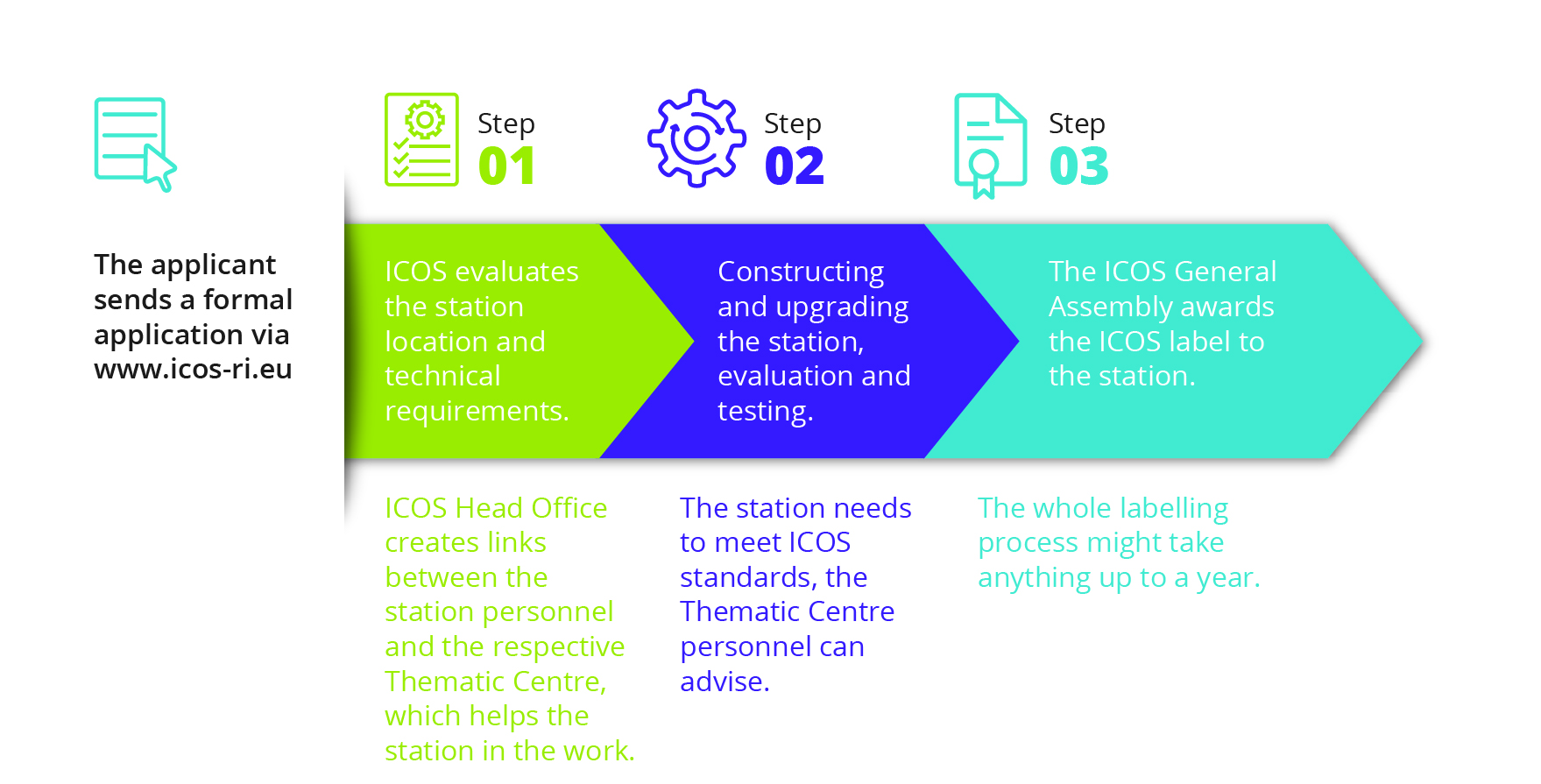
All the stations have to go through the demanding standardisation and quality control programme of ICOS, in order to meet the high standards and to receive the label for standardised greenhouse gas measurement station. The station labelling is an integrate process for final implementation of ICOS standards and compliance check for the stations. Station labelling starts with a formal application that also needs approval by the national government. The station can apply for Class 1 station, Class 2 station, or in the case of ecosystem stations, an Associated station label.
As of 2023, altogether 124 ICOS measurement stations out of 173 have been standardised for greenhouse gas measurements.
Station classes: Class 1, Class 2 & Associated stations
The Atmosphere and Ecosystem networks include two classes of stations: Class 1 stations are equipped with complete equipment for measuring a full set of predetermined ICOS variables, and Class 2 stations are equipped for measuring a predefined subset of the ICOS variables. Importantly, the standardisation and quality of the data are at same level in both station categories.
In addition, the ICOS Ecosystem network is supplemented by a set of associated stations in which the requirements, in terms of the variables examined and the standards followed, are different from the Class 1 and Class 2 stations. Currently, in the Ocean network, only the term Class 1 is used.
Station labelling process
The compliance of the stations to ICOS standards is of utmost importance to the users of ICOS data. To guarantee data reliability and quality across the stations, ICOS has designed a unique quality-assurance process called station labelling. The process has tight criteria that each station has to fulfil, both for the measurements at the stations and for data production. Once the station fulfils all the criteria set for an ICOS station, it receives an ICOS label as a guarantee that the data produced are of the highest quality.
To start the process, a country representative, Focal Point (a national coordinator) or General Assembly delegate officially announces the new station to the Head Office. Each ICOS station must be approved by its host institution and national government. However, before formally applying to become a labelled ICOS station, the interested party is advised to contact the appropriate Thematic Centre to discuss the station in terms of network design and station characteristics.
The steps of the ICOS station labelling process
Station labelling process ensures common ICOS standards and the data quality. Figure below summarises the process of station labelling.

Process for stations to become ICOS labelled
Benefits of ICOS labelling for the stations and their staff
- ICOS stations will take part in the latest developments of cutting-edge greenhouse gas measurement techniques and updated data processing routines, which reduces the amount of work at the stations once they are labelled.
- ICOS stations will get substantial technical support for station operations in order to assure data qual-ity. ICOS stations’ staff will be involved in training activities organized by the Thematic Centres and Carbon Portal on the best and most updated prac-tices for data acquisition and data use.
- The standardisation of the measurements and harmonized data processing, quality control and archiving are guaranteed through the Thematic Centres and the Carbon Portal data services to will ensure the highest quality, comparability and credibility for the data.
- The provision of elaborated data products, such as advanced visualizations and flux maps in time and space, will increase the impact of the data.
- ICOS will provide support through contacts with equipment manufacturers and negotiates group prices for official ICOS stations.
- The global visibility of ICOS stations will increase due to the high-quality data provided and the large number of users. This will also have a strong positive effect on the host institution in terms of attractiveness.
- ICOS stations’ data use will be professionally tracked and cited in peer-reviewed articles, which will increase the visibility of the station’s staff and institution.
- ICOS stations will get support from the Head Office in searching for funding opportunities at the national and international levels using the well-developed ICOS brand in supporting proposals.
Contacts of ICOS Thematic Centres
| Atmosphere Thematic Centre Dr Leonard Rivier ICOS Atmosphere Thematic Centre LSCE-Orme, point courrier 129 CEA-Orme des Merisiers F-91191 Gif-sur-Yvette, CEDEX FRANCE E-mail: contact-atc@lists.icos-ri.eu |
Ecosystem Thematic Centre Dr Dario Papale ICOS Ecosystem Thematic Centre DIBAF University of Tuscia Largo dell’Università - Blocco D 01100 Viterbo ITALY E-mail: contact-etc@lists.icos-ri-eu |
Ocean Thematic Centre Dr Richard Sanders ICOS Ocean Thematic Centre Nygårdsgaten 112 5008 Bergen NORWAY E-mail: contact-otc@lists.icos-ri.eu |